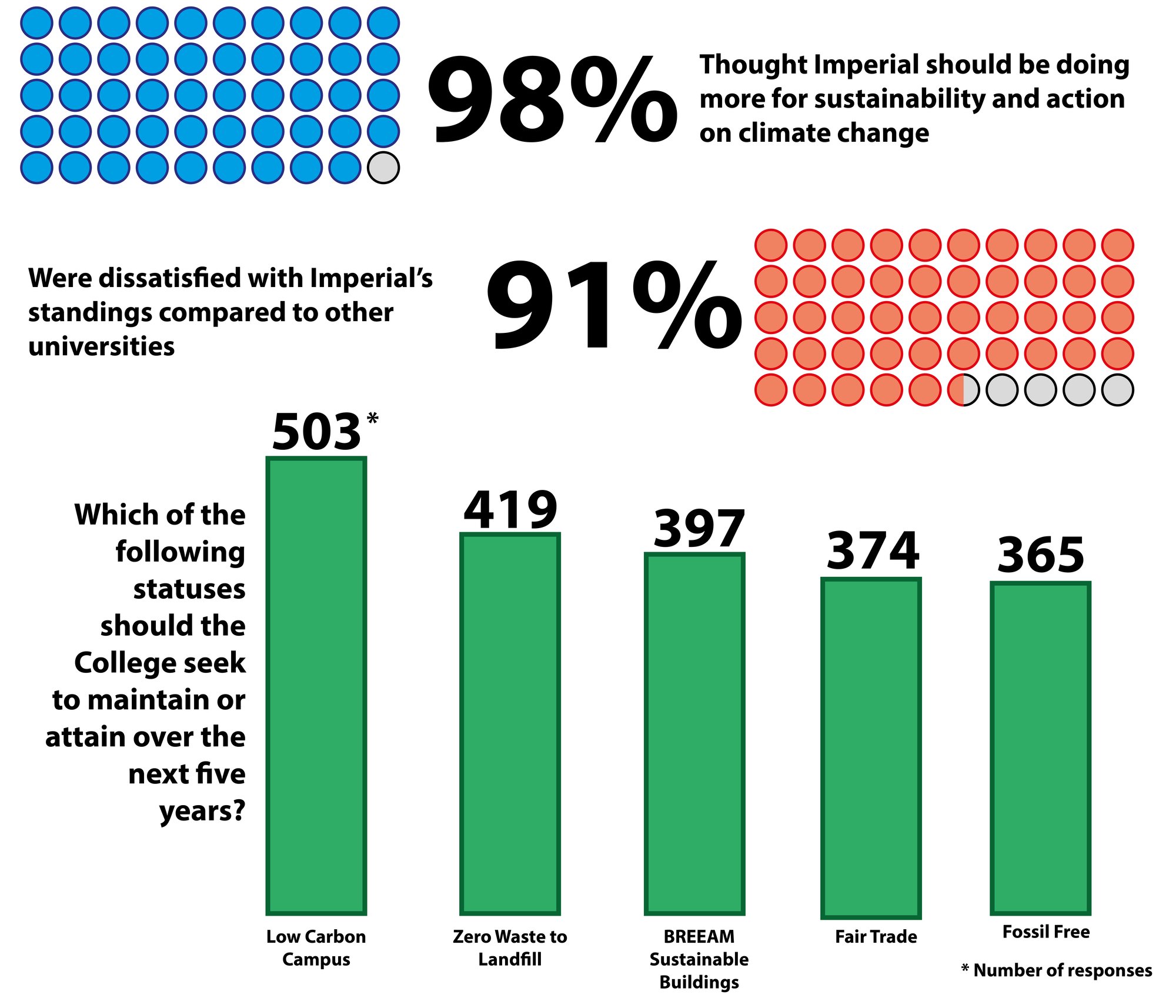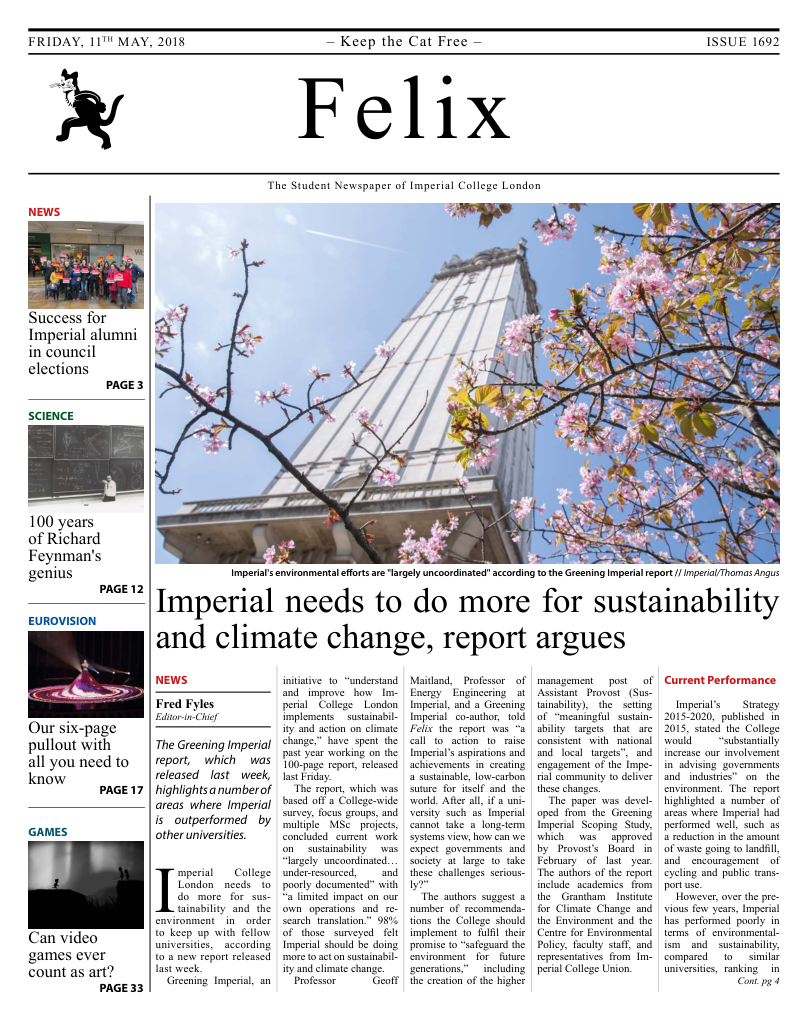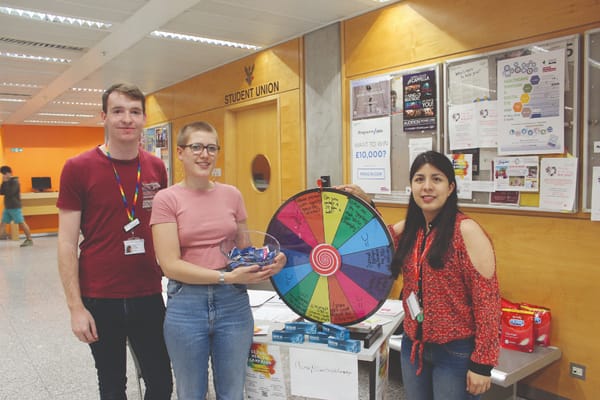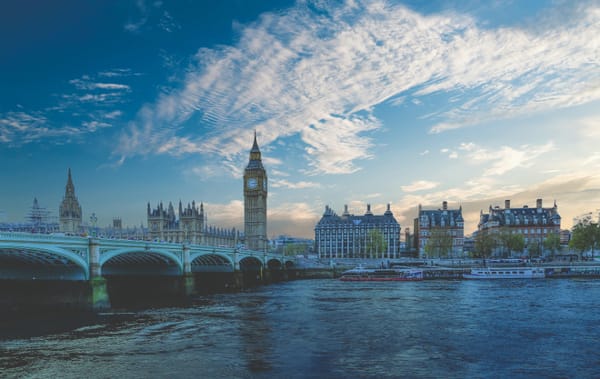Imperial needs to do more for sustainability and climate change, report argues
The Greening Imperial report, which was released last week, highlights a number of areas where Imperial is outperformed by other universities.

Imperial College London needs to do more for sustainability and the environment in order to keep up with fellow universities, according to a new report released last week.
Greening Imperial, an initiative to “understand and improve how Imperial College London implements sustainability and action on climate change,” have spent the past year working on the 100-page report, released last Friday.
The report, which was based off a College-wide survey, focus groups, and multiple MSc projects, concluded current work on sustainability was “largely uncoordinated…under-resourced, and poorly documented” with “a limited impact on our own operations and research translation.” 98% of those surveyed felt Imperial should be doing more to act on sustainability and climate change.
Professor Geoff Maitland, Professor of Energy Engineering at Imperial, and a Greening Imperial co-author, told Felix the report was “a call to action to raise Imperial’s aspirations and achievements in creating a sustainable, low-carbon suture for itself and the world. After all, if a university such as Imperial cannot take a long-term systems view, how can we expect governments and society at large to take these challenges seriously?”
The authors suggest a number of recommendations the College should implement to fulfil their promise to “safeguard the environment for future generations,” including the creation of the higher management post of Assistant Provost (Sustainability), the setting of “meaningful sustainability targets that are consistent with national and local targets”, and engagement of the Imperial community to deliver these changes.
The paper was developed from the Greening Imperial Scoping Study, which was approved by Provost’s Board in February of last year. The authors of the report include academics from the Grantham Institute for Climate Change and the Environment and the Centre for Environmental Policy, faculty staff, and representatives from Imperial College Union.
Current Performance
Imperial’s Strategy 2015-2020, published in 2015, stated the College would “substantially increase our involvement in advising governments and industries” on the environment. The report highlighted a number of areas where Imperial had performed well, such as a reduction in the amount of waste going to landfill, and encouragement of cycling and public transport use.
However, over the previous few years, Imperial has performed poorly in terms of environmentalism and sustainability, compared to similar universities, ranking in the bottom decile for university sustainability. Earlier this academic year, Imperial came 141st in the People and Planet ethical league tables – the lowest scoring university of the Russell Group.
The report said Imperial’s ranking in the People and Planet league tables was due to both “Imperial’s meagre reporting…of its good practices”, and “inadequacies in leadership, policies, targets, practices, and community engagement.” They concluded these benchmarks raised “serious concerns that we are lagging behind our peers”.
Imperial has also faced difficulties in reducing harmful emissions: the 2015 University Carbon Progress Report ranked Imperial 107th out of 126 institutions, after it had reduced its carbon emissions by only 9% in the previous ten years.
Imperial has also increased their overall greenhouse gas emissions since 2009; they will need to reduce them by 60% in the future to adhere to government targets. College Energy use has increased by 15% per capita over the last four years.
Out of the 850 staff, students, friends, and alumni who filled out the survey, 91% were dissatisfied with Imperial’s national performance.
One member of professional staff who responded said this “poor engagement” with sustainability “carries a reputational risk that could undermine our academic work on sustainability and climate change.”
Communication and Leadership
One of the main areas for improvement identified by the survey was communication and leadership: only 15% of students could identify a sustainability leader, 73% had a poor understanding of what Imperial does for sustainability, and 82% had a poor understanding of the College’s current performance on sustainability.
The report said the College’s approach to sustainability was “neither clear nor very visible,” and “reporting of relevant data and achievement is poor, or non-existent.” While Imperial’s Strategy includes action on sustainability, it is “referred to only obliquely… with a focus mainly on research outputs and innovation.”
In comparison, universities such as the London School of Economics (LSE), UCL, and King’s College London (KCL)have made sustainability more central to their strategies. Greening Imperial said this could lead to “[erosion of] our competitive position and our aspiration to be the leading London university.”
One of the key recommendations the report has put forward is the creation of the position of Assistant Provost (Sustainability) – a new member of senior management who would “work with all arms of the College” to “drive the transformation of our performance and delivery in this area.” The Assistant Provost (Sustainability) would report to the Provost, and would be supported by a Sustainability Leadership Group.

Community
As well as involvement from senior leadership, the report calls for Imperial to do more to foster a community around the goal of sustainability: currently sustainability comes under the remit of the Health, Safety, and Environment Committee. Students, academic staff, and alumni are not included within the current model.
The report says this has meant the College community feels “disenfranchised and powerless around sustainability”, with students and staff “currently feel[ing] inhibited, or at least not encouraged.”
Greening Imperial recommend the creation of ‘Sustainability Champions’ – identifiable staff and students responsible for promoting sustainability. Currently Imperial has one such individual, compared to around 100 at UCL and 150 at Cambridge. Those behind Greening Imperial seemed confident such a community could be developed – 65% of respondents to their survey said they would like to be involved in future initiatives.
This sense of isolation was supported by some of the comments received through the Greening Imperial Survey. One member of professional staff said they had been “shocked” at “what I perceived to be a total lack of consideration for sustainability and action on climate change. I quickly learned not to question the processes in place or voice my thoughts on the matter – my perception has sadly not changed.”
An academic member of staff added they were “ashamed to work at a university that’s supposed to pioneer sustainability but are this bad at practicing what they preach.” Students have also highlighted their dissatisfaction with Imperial’s relationship with sustainability: a number of student groups approached Greening Imperial with concerns over plastic disposable cutlery and single-use coffee cups
Research & Education
The lack of a concerted drive towards sustainability on campus is surprising when considering the amount of sustainability-related research Imperial carries out. The university receives around £100 million each year in funding for sustainability-related research, representing about a third of the total funding from research grants and contracts. The main areas of such funding are found in the Departments of Physics, Medicine, and Life Sciences. There was also a general consensus that the research being carried out was of excellent quality.
However, the report highlighted there was “greater scope for sustainable and impactful interdisciplinary research”, and the College should look towards “implementation [of research outputs] where possible on campus.”
The report also called for greater integration of sustainability into the curriculum, saying students at Imperial could “progress through their degree without ever having to critically think about their actions on the environment, society, or the economy.” While there are a number of postgraduate courses centred around sustainability, the exposure undergraduate students have to such content can be limited; last year’s Global Challenge Horizons module – an optional module available to undergraduate students – was cancelled due to lack of demand.
Divestment
One area the report highlighted was Imperial’s investments in fossil fuels. Around half of those asked about what initiatives the College should support said the university should go Fossil Free, with over 40 raising the issue in further comments.
The report highlighted the work that had been done by the student pressure group Divest Imperial, who met with Imperial senior management earlier this year. The report said the College “doesn’t think it’s immoral to receive funds” from fossil fuel companies, and believed investment in fossil fuels was good for the environment.
The Greening Imperial report recommends the College investigate how the endowment fund can be invested in businesses that are environmentally sustainable. Professor Jo Haigh, Co-Director of the Grantham Institute and Greening Imperial co-author, told: “As a first step we would like to see college introduce a Responsible Investment Policy in order to assess the environmental and ethical credentials of its current and future investments. We hope that Greening Imperial will participate in and inform the divestment debate to help Imperial take a leadership position on this topic.”
Earlier this academic year, an investigation from Felix found Imperial had nearly £9 million invested in fossil fuel companies through their endowment fund. The College also had £3.5 million invested in tobacco and £3.1 million invested in the arms industry. In the People and Planet league tables, the College had a rating of zero for ethical investment.
Over the past couple of years, the number of universities divesting from fossil fuels has risen dramatically. It now stands at over sixty institutions, including King’s College London, Edinburgh, and the University of St. Andrews.
Next Steps
The scoping study presented to the Provost’s Board was met with an “overwhelmingly positive” response, according to Professor Maitland, but the report “still needs to be approved as part of the planning round process over the summer.”
A representative of Imperial College Union said they welcomed the report, and told Felix: "With the backing of the Provost’s Board and the involvement of the past two Deputy Presidents (Finance & Services), Rachel Blythe and Matthew Blackett, as co-authors, we are confident that this report will lead to the change which our members would like to see at Imperial. We would also like to thank all of the students who responded to the survey earlier in the year. The results of this have contributed to shaping the outcomes of this report. We are looking forward to seeing the changes which College are going to make off the back of this report to improve the sustainability of all our campuses and operations for students, staff and the communities in which we operate"
One concern for staff and students at Imperial may be the cost of implementing the recommendations put forward in the three-year plan drawn up by Greening Imperial. The authors of the report argue that not investing in sustainability now will lead to an increase in costs in the near future, both in terms of government directives and expenditure on operations.
Professor Haigh told Felix: “Reducing the environmental impact of college will help to reduce operating costs for utilities such as energy and water so Greening Imperial should make financial sense as well as being the right thing to do in terms of our environmental and ethical impact. It also has the potential to help create a more pleasant (greener) working environment, bringing people together from across college and promoting a stronger sense of community.”








